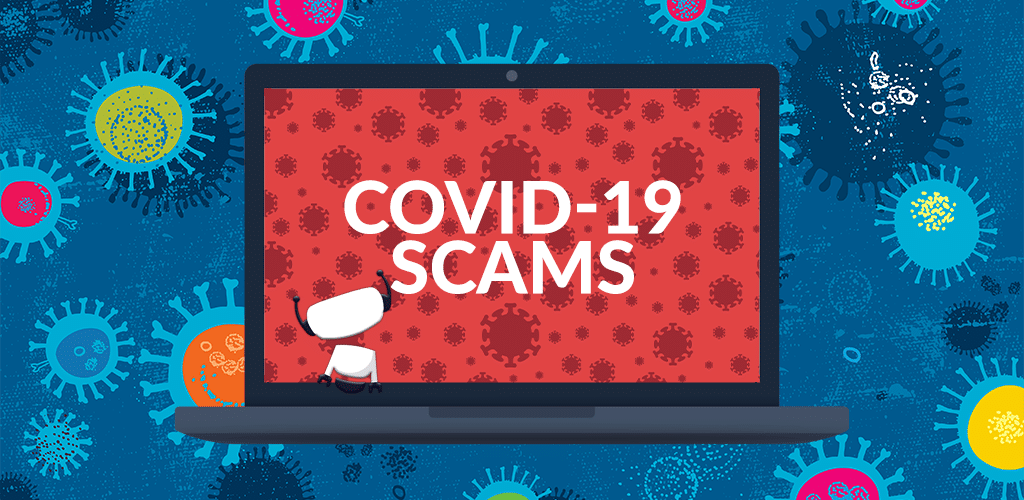March 19, 2020
Your Guide to the COVID-19 Scams Infecting the Internet
Posted by Rhiannon

A new disease is infecting the world. For months, news of the novel coronavirus has dominated headlines. Although people are coming together in these trying times, there are others profiting from COVID-19. Scammers and hackers are one such group. Through the use of phishing and other tactics, they’re spreading a different type of infection online, such as viruses and malware. They’re also using panic and misinformation to trick people out of money and sensitive information. Protect yourself from the COVID-19 scams hitting the web with these tips:
- Recognize the scam
- Don’t download or click anything
- Only visit trustworthy sites
- Donate wisely
- Remain calm
Recognize the Scam
In just a few months, hackers have implemented clever scams for tricking the unsuspecting person. Recognizing potential scams can protect you against them. These are just a few of the ones we’ve seen so far:
- Fake Donation Pages: In an effort to effectively combat COVID-19, many organizations are asking for donations. These donations help purchase equipment like ventilators, masks, hand sanitizer, and similar products. However, not all donation pages are real.
- Messages From the WHO and CDC: Two of the most legitimate sources for news about the novel coronavirus are the WHO and the CDC. Unfortunately, scammers have begun posing as these organizations in an attack known as phishing. They use official-looking emails in an attempt to convince recipients to download “safety tips.” However, these downloads contain malware that can steal banking information and keylog trackers.
- Fake Cures: Many people are desperate for a cure to COVID-19. Knowing this, scammers are sending emails and setting up sites claiming to have a cure. In order to get it, all you have to do is click on a link or give them info like your SSN, credit card number, and mother’s maiden name. Some sites also offer masks or hand sanitizer in exchange for your personal data.
- Fraudulent Websites: Another of the COVID-19 scams has scammers buying domain names related to the virus. The websites they set up often act as malware injectors, to infect your devices.
- Tax Scams: The novel coronavirus is impacting many people financially, by putting a halt to many types of work. Scammers use this knowledge and pose as tax agencies promising refunds and credits. In order to receive these refunds, they ask you to click on a link or send them your personal information.
Don’t Download or Click Anything From Emails
In general, health organizations will not ask you to download content. Health tips, quarantine guidelines, and more can easily be included in the body of an email. Unless you are absolutely certain a download is safe, don’t allow it access to your devices. This advice also goes for links embedded in emails. If you aren’t sure, you can check their validity by copying the link and pasting the text to check its destination. However, in either situation, it’s most advisable to simply navigate to the real website that supposedly sent the email. Check out these tips for deciding if an email is legit or not.
Only Visit Trustworthy Sites
Many websites claim to have information about the COVID-19 pandemic. However, not all of them are legitimate. Some may be used to spread misinformation. Others contain malware designed to infect your devices. In order to get the most accurate information from safe sources, take a look at websites from organizations like the WHO, the CDC, or your local news agencies. In addition, make sure any site you visit is HTTPS encrypted. This level of security will help protect you further.
Donate Wisely
Donating your money is a great way to help the effort against COVID-19. But how do you know your money will go to the right place? First, try donating to organizations you are familiar with. Second, if they’re asking for your donation in cryptocurrency, run. Most importantly, trust your gut. If something feels wrong, don’t donate.
Remain Calm
The success of COVID-19 scams is directly related to public panic. Many people are looking for protection and safety and are willing to try anything. Unfortunately, “anything” might be malware or a computer virus. One of the best ways to avoid falling into these traps is remaining calm. Stay up-to-date with the news and statistics, listen to officials, and follow local guidelines for staying safe.
Posted by Rhiannon
More Blog Posts
February 14, 2023
How to Easily Unblock Wikipedia with HotBot VPN
Wikipedia puts a wealth of information at your fingertips. Everything from the biography of Alexander Graham Bell to the basics of quantum computing can be instantly opened by curious browsers. But what happens when you can’t access that information? Whether a business network blocks it or a particular country censors it, don’t let that slow […] Read moreFebruary 14, 2023
How to Unblock Skype with HotBot VPN
Need to make a business call? Want to talk to your grandma an ocean away? Excited to video chat with your friends on the weekend? Chances are, Skype is your go-to video messaging service. It allows users to connect to people anywhere in the world. Anywhere, that is, where Skype isn’t blocked. Unfortunately, networks may […] Read moreFebruary 14, 2023

